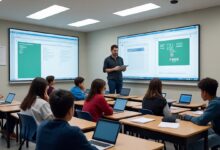The Role of EdTech in Special Education

EdTech in Special Education, In today’s digital age, technology has revolutionized various aspects of our lives, and education is no exception. Particularly, in the field of special education, where students with diverse learning needs require tailored support, Educational Technology (EdTech) has emerged as a powerful tool to facilitate inclusive and effective learning experiences. This article explores the role of EdTech in special education, highlighting its benefits, challenges, and future possibilities.
Special education encompasses a range of instructional strategies and support systems designed to meet the unique learning needs of individuals with disabilities. These learners may face challenges in areas such as cognition, communication, mobility, or social interaction. To address these challenges effectively, educators and stakeholders have turned to EdTech solutions that offer personalized, engaging, and accessible learning experiences.
Read More: Top 10 Challenges of Implementing EdTech in Developing Countries
Understanding Special Education
EdTech in Special Education, Special education refers to the educational provisions and support services tailored to meet the specific needs of students with disabilities. It involves individualized instruction, accommodations, and assistive technologies to facilitate the learning and development of students with diverse abilities.

Challenges in Special Education
Accessibility
One of the key challenges in special education is ensuring accessibility for all students. EdTech can help overcome this challenge by providing adaptive learning platforms, assistive technologies, and inclusive design features that cater to different learning styles and disabilities.
Individualized Instruction
EdTech in Special Education, In special education, individualized instruction plays a crucial role in addressing the unique needs of each student. EdTech platforms enable educators to customize learning materials, adapt instruction to specific learning goals, and track progress more efficiently, thereby promoting personalized learning experiences.
Engagement and Motivation
Maintaining student engagement and motivation can be a significant challenge in special education settings. EdTech offers interactive and multimedia-rich learning experiences, gamification elements, and real-time feedback, which can enhance student motivation and participation.
The Rise of EdTech in Special Education
EdTech in Special Education, In recent years, there has been a notable rise in the integration of EdTech tools and solutions in special education classrooms. These technologies have proven to be instrumental in creating inclusive learning environments and providing individualized support. Several categories of EdTech solutions have gained popularity in special education:
Adaptive Learning Platforms
Adaptive learning platforms utilize intelligent algorithms to analyze student performance and tailor learning materials accordingly. These platforms adjust the difficulty level, pace, and content of instruction based on individual student needs, ensuring a personalized learning experience.
Virtual Reality and Augmented Reality
EdTech in Special Education, Virtual reality (VR) and augmented reality (AR) technologies have gained prominence in special education due to their immersive and interactive nature. VR and AR applications provide realistic simulations and virtual environments, allowing students to explore and learn in a safe and controlled setting.
Communication and Collaboration Tools
Effective communication and collaboration are essential in special education to foster inclusive and supportive learning environments. EdTech tools like video conferencing platforms, communication apps, and collaborative software enable students, teachers, and parents to connect, share resources, and collaborate remotely.
Benefits of EdTech in Special Education
EdTech in Special Education, The integration of EdTech in special education offers numerous benefits for both students and educators. Some of the key advantages include:

Personalized Learning
EdTech tools provide personalized learning experiences by adapting instruction to the individual needs and abilities of each student. This individualized approach helps students progress at their own pace and focus on areas where they need additional support.
Improved Accessibility
EdTech solutions promote accessibility by offering a wide range of features and functionalities designed to accommodate different learning styles and disabilities. These include closed captioning, text-to-speech capabilities, customizable interfaces, and alternative input methods.
Increased Engagement and Motivation
EdTech in Special Education, Engagement and motivation are critical factors in special education. EdTech tools incorporate interactive elements, gamification features, and multimedia resources to make learning more engaging and enjoyable. This, in turn, helps maintain student interest and participation.
Enhanced Communication and Collaboration
EdTech facilitates effective communication and collaboration among students, educators, and parents. It enables real-time feedback, remote collaboration, and seamless information sharing, fostering a supportive network and strengthening the partnership between all stakeholders involved in the student’s education.
Considerations for Implementing EdTech in Special Education
EdTech in Special Education, While EdTech holds tremendous potential in special education, its successful implementation requires careful consideration of certain factors:
Accessible and Inclusive Design
EdTech tools should be designed with accessibility and inclusivity in mind. They should adhere to web accessibility standards, provide multiple means of representation and expression, and ensure compatibility with assistive technologies.
Professional Development and Training
EdTech in Special Education, Teachers and educators must receive adequate professional development and training to effectively integrate EdTech into their instructional practices. Training programs should focus on the proper use of specific tools, accessibility guidelines, data privacy, and effective pedagogical strategies.
Privacy and Security
EdTech in Special Education, As with any technology implementation, data privacy and security are paramount. EdTech providers should prioritize robust security measures, comply with data protection regulations, and ensure that student information remains confidential and secure.

Success Stories: Real-Life Examples
Numerous success stories illustrate the positive impact of EdTech in special education. For instance, the use of adaptive learning platforms has led to significant improvements in student outcomes by providing tailored instruction and immediate feedback. Augmented reality applications have facilitated hands-on learning experiences for students with physical disabilities, while communication tools have enhanced collaboration between educators and parents, leading to better support for students’ individual needs.
Overcoming Challenges and Future Opportunities
Although EdTech has made substantial strides in special education, challenges persist. These include access to reliable technology Despite the challenges, the future of EdTech in special education holds immense potential. Here are some opportunities for further growth and development:
Personalized Learning Paths
EdTech in Special Education, Advancements in artificial intelligence and machine learning can lead to more sophisticated adaptive learning platforms. These platforms can analyze vast amounts of data to create highly personalized learning paths that cater to the unique needs and preferences of each student.
Assistive Technologies Innovation
Continued innovation in assistive technologies can greatly benefit students with disabilities. For example, advancements in speech recognition, eye-tracking, and haptic feedback can enable more accurate and intuitive interactions, allowing students to overcome physical and communication barriers.
Data-Driven Decision Making
The collection and analysis of data through EdTech tools provide valuable insights into students’ progress, strengths, and areas for improvement. Educators can use this data to make informed decisions, adjust instructional strategies, and provide targeted interventions, leading to better educational outcomes.
Collaboration and Professional Networks
EdTech can facilitate collaboration and networking among educators, researchers, and professionals in the field of special education. Online communities, forums, and platforms can serve as spaces for sharing best practices, resources, and research findings, fostering a culture of continuous improvement.
Inclusive Design and Universal Access
EdTech in Special Education, The ongoing focus on inclusive design principles can ensure that EdTech tools are accessible to all students, regardless of their abilities. By considering diverse needs from the outset, developers can create tools that are usable by a wide range of learners, promoting inclusivity and equal opportunities for all.
EdTech in Special Education, Conclusion
EdTech has revolutionized special education by offering innovative solutions to address the unique challenges faced by students with disabilities. From adaptive learning platforms to assistive technologies and immersive experiences, EdTech has the potential to transform teaching and learning, enhance accessibility, and improve educational outcomes. However, successful implementation requires thoughtful consideration of accessibility, professional development, and privacy concerns. As we continue to leverage the power of technology, it is crucial to ensure that EdTech remains an empowering tool that supports and enhances the educational journey of every student.
Read More: 10 Important Role of EdTech in Personalized Learning
FAQs
Q: How does EdTech help in addressing individual student needs?
EdTech provides personalized learning experiences by adapting instruction to meet the specific needs and abilities of each student. Through adaptive learning platforms, assistive technologies, and customizable resources, students can receive targeted support and progress at their own pace.
Q: What are some popular assistive technologies used in special education?
Popular assistive technologies used in special education include screen readers, speech recognition software, alternative input devices, text-to-speech tools, and communication aids. These technologies help individuals with disabilities overcome barriers to learning and communication.
Q: Are there any specific guidelines for designing accessible EdTech tools?
Yes, there are specific guidelines and standards, such as the Web Content Accessibility Guidelines (WCAG), that provide recommendations for designing accessible EdTech tools. These guidelines focus on inclusive design principles, ensuring that tools are usable by individuals with diverse abilities.
Q: How can EdTech enhance communication and collaboration in special education?
EdTech tools such as video conferencing platforms, communication apps, and collaborative software facilitate seamless communication and collaboration between students, educators, and parents. These tools enable real-time feedback, resource sharing, and remote collaboration, fostering a supportive learning environment.
Q: What does the future hold for EdTech in special education?
The future of EdTech in special education is promising. Advancements in personalized learning, assistive technologies, data-driven decision making, collaboration, and inclusive design will continue to shape the landscape of special education, providing innovative solutions and better opportunities for students with disabilities.












One Comment